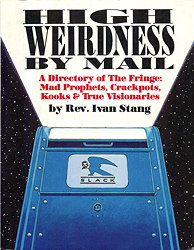Food
Waymarking
The Waymarking site allows the user to add a geo-tag to any object or place to make it findable by anyone else.They have their entries grouped into categories, and certainly the Oddities subgroup will be of interest to WU-vies.
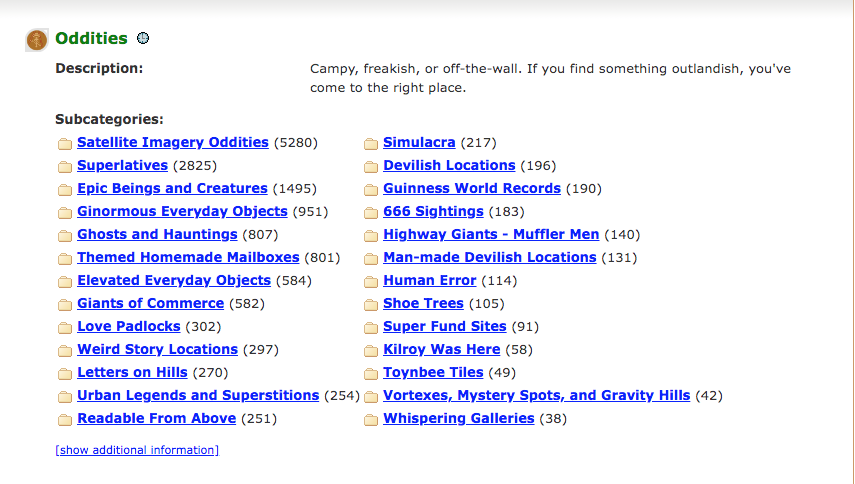
There you can find, among other things, giant commercial icons such as the one below.
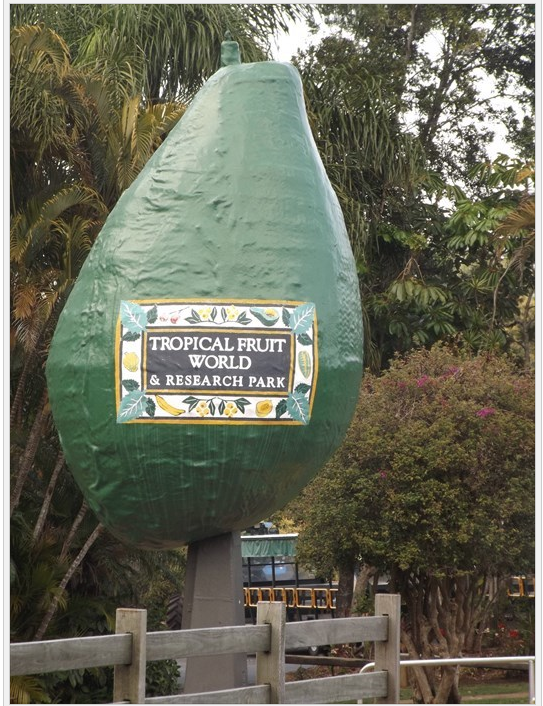
Posted By: Paul - Thu Oct 08, 2020 -
Comments (1)
Category: Food, Geography and Maps, Advertising
Human Blood Pudding
Dr. Magnus Pyke was a scientific advisor to the British Ministry of Food during World War II. In 1969, during a lecture at the Royal Institution in London, he revealed the following:At that time large amounts of human blood were collected from such people as were prepared to give it. The blood was centrifuged, the plasma put aside for parenteral injection into those victims of bombing that might need it, and the red corpuscles discarded.
Again the scientific advisers to the minister of food put forward a scheme to make use of the red-blood corpuscles, so self-sacrificingly contributed by patriotic donors, and manufacture from it black pudding for distribution on the food ration.
The curious anthropological phenomenon then emerged that although the British were prepared to consume each other's blood by vein, they considred its ingestion by mouth was a variant of cannibalism and therefore disgusting.
They could have called it Soylent Black.
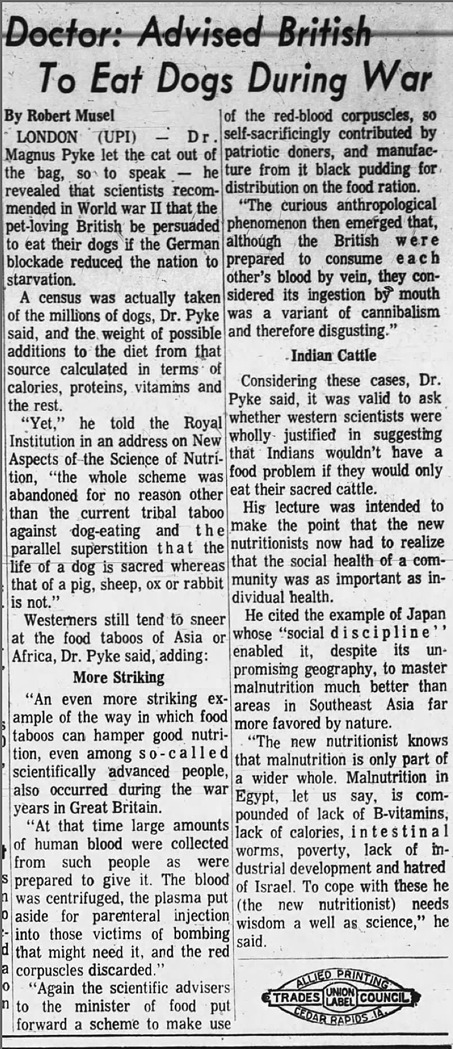
The Cedar Rapids Gazette - Dec 18, 1969
Posted By: Alex - Wed Oct 07, 2020 -
Comments (3)
Category: Cannibalism, Food, 1940s, Blood
Follies of the Madmen #489
Nightmare depiction of a leering middle-aged man convinces kids to drink horrid-tasting stuff.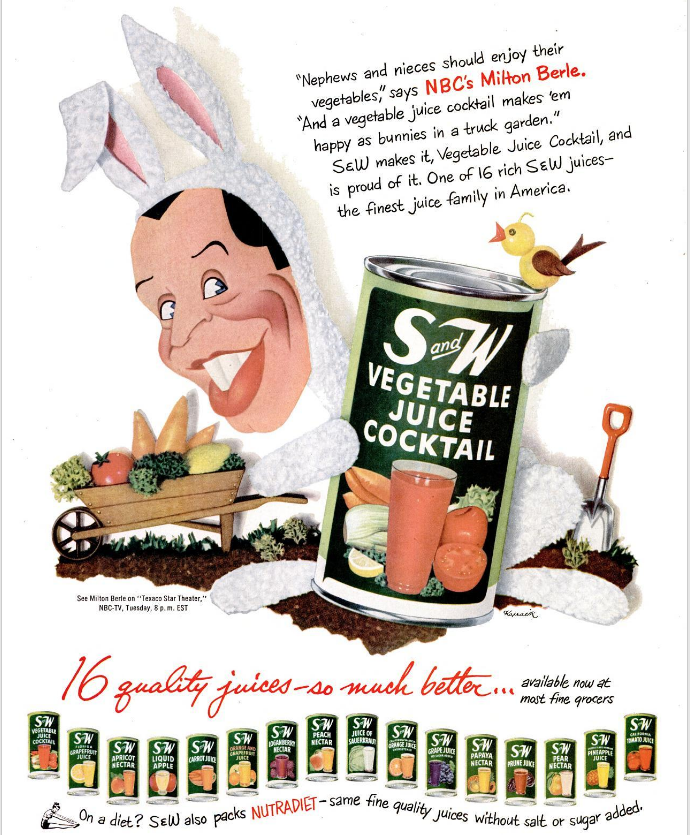
Source.
Posted By: Paul - Sun Sep 27, 2020 -
Comments (3)
Category: Food, Children, 1950s, Fictional Monsters
An Intentional Cannibal
There's an old urban legend, which folklorist Jan Harold Brunvand refers to as 'The Accidental Cannibals,' about people who accidentally eat the cremated remains of a loved one:A recent version of the legend describes the cremains of a relative shipped home from Australia to England and mixed there into the Christmas pudding. Half the pudding has been consumed by the time the letter of explanation anives.

In a case of urban-legend-becomes-real-life, performance artist Eva Margarita has announced that she'll be mixing the cremated remains of her father into three different entrees and then eating them. She'll be doing this "to not only honor his spirit but to show how communities pass on knowledge through a practice in eating and conjuring with one another."
Her performance will be broadcast live on the Internet. It's happening today (Sep 23, 2020), from 8 AM to 8 PM (eastern time).

In an interview on timeout.com, Margarita offers some details about how she'll prepare her father's cremains:
Thanks to Gerald Sacks!
Posted By: Alex - Wed Sep 23, 2020 -
Comments (0)
Category: Cannibalism, Food, Performance Art
The Jesus Tortilla
Oct 5, 1977: Maria Rubio was preparing a tortilla in a skillet in her home in Lake Arthur, New Mexico. When she looked down, she realized that a burn mark on the tortilla resembled the face of Jesus.The Rubio family created a small shrine where they displayed the "Jesus tortilla". Over the years, tens of thousands of people came to see it. Many of the pilgrims believed that the tortilla had the power to heal.

Maria Rubio with tortilla - 1978
Maria Rubio's daughter, Angelica, grew up to become a New Mexico state senator, and she kept a blog where she discussed her experiences with the holy tortilla. She also wrote an article on eater.com about it.

The Jesus Tortilla - source: thetortillakid.com
According to Roadside America: "In late 2005, Mrs. Rubio's granddaughter took the Miracle Tortilla into school for Show and Tell, and it was dropped and broken! The shed shrine has been closed and the remains retired to a drawer in the Rubio's home."

Albuquerque Journal - Dec 22, 1987
Posted By: Alex - Mon Sep 21, 2020 -
Comments (2)
Category: Food, Religion, 1970s, Pareidolia
Ice Cream for Small Plants
Authored by Etta Howes Handy and published in 1937 by The Hotel Monthly Press.Of course she means manufacturing plants, but I prefer to imagine people feeding ice cream to their house plants.
Amazon link

Posted By: Alex - Sun Sep 13, 2020 -
Comments (1)
Category: Food, Books
Follies of the Madmen #487
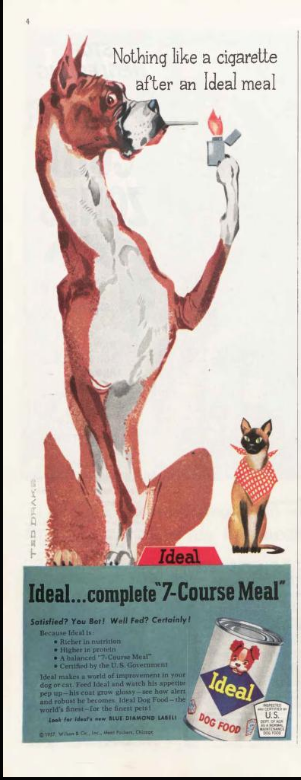
This impossible freakish dog is a true representative of the species, and thus can be a fine judge of the sponsor's food.
Plus, cats are jealous of both dog food and cigarettes.
Ad source.
Posted By: Paul - Sun Sep 06, 2020 -
Comments (1)
Category: Anthropomorphism, Business, Advertising, Food, Cats, Dogs, 1950s
Potato Ice Cream
Idaho farmer Alan Reed invented Potato Ice Cream in the mid-1980s. This wasn't potato-flavored ice cream. Instead, it was ice cream that included potatoes (in addition to dairy) as an ingredient. The advantage of this was that the potatoes sweetened the ice cream, eliminating the need to add sugar. The result was a lower-calorie, sugar-free ice cream. Reed claimed it tasted as good as regular ice cream.However, Reed had trouble getting his potato ice cream distributed, so he sold the formula and marketing rights in 1988 to businessmen Rich Davis and James McFrederick. I assume (because I've never seen potato ice cream in a store) that they didn't manage to make a go of it either. The fact that there were better (or cheaper) sugar substitutes probably doomed Potato Ice Cream.
Reed is still operating his dairy farm and selling ice cream. But his website makes no mention at all of potatoes.
However, I don't think he's entirely given up on the idea of using potatoes to sweeten dairy, because his chocolate milk contains potato flakes (if you look closely at the ingredients). And this chocolate milk is sold in the gift shop of the Idaho Potato Museum.
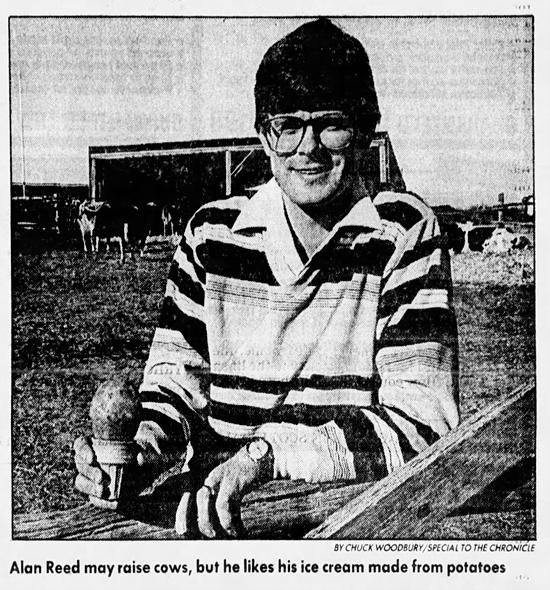
San Francisco Examiner -Dec 6, 1987
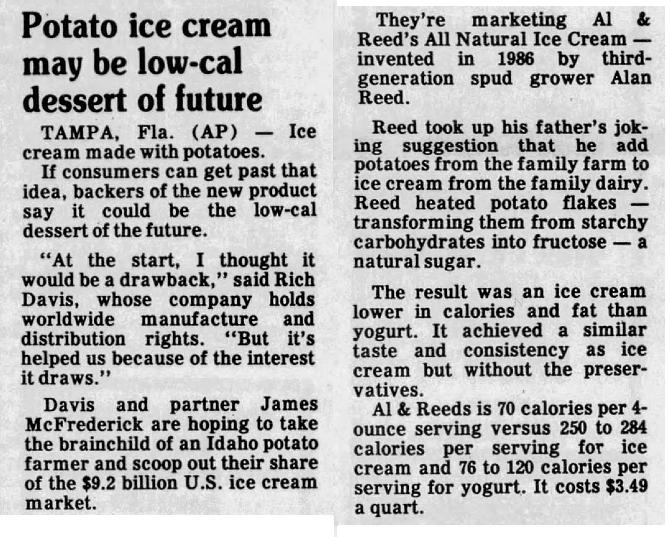
Longview Daily News - Nov 16, 1990
Posted By: Alex - Tue Sep 01, 2020 -
Comments (2)
Category: Food, 1980s
Cottolene
As the Wikipedia page tells us:Cottolene was a brand of shortening made of beef suet and cottonseed oil
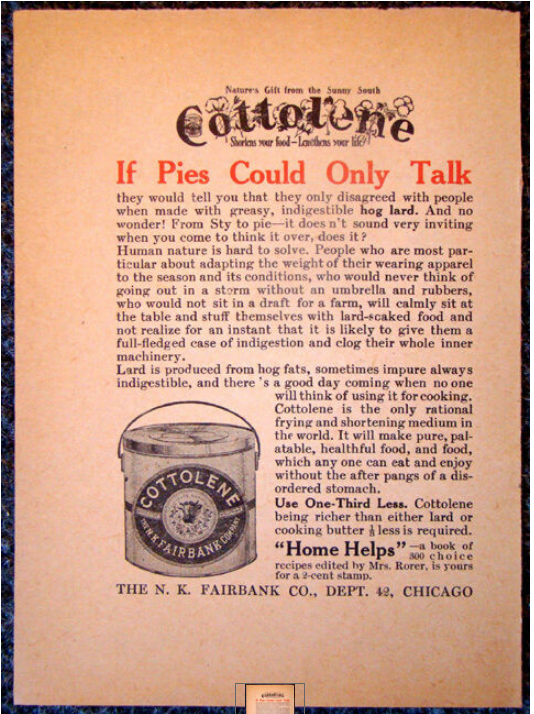

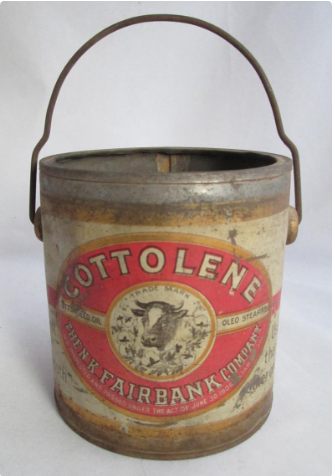
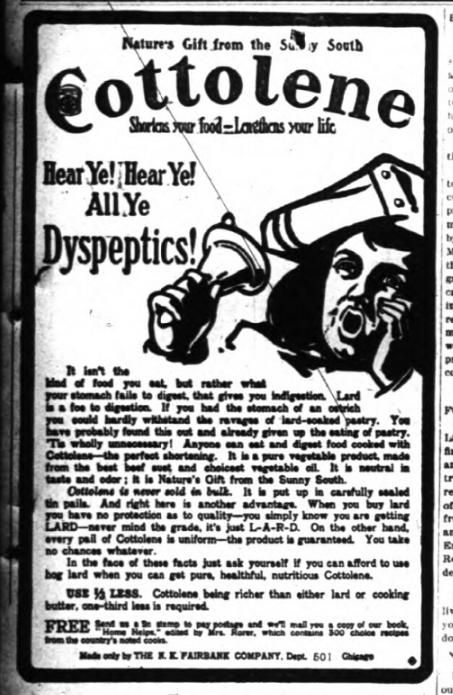
Posted By: Paul - Fri Aug 07, 2020 -
Comments (5)
Category: Food, Nineteenth Century, Twentieth Century, Nausea, Revulsion and Disgust
Cooking with God
Poe's Law, loosely paraphrased, states that it can be very difficult to tell the difference between parodies of extreme beliefs and sincere expressions of those beliefs.Confusion of this kind occurred with the 1976 cookbook Cooking With God. The authors, Lori David and Robert Robb, intended it to be, in all seriousness, a religious-themed cookbook. But due to the title, many people apparently assumed it was some kind of joke.
Recipes included Manna Honey Bread, Oasis Stuffed Eggs, Caravan Sweet Potatoes, and Eggs Bathsheba.
If you want a copy to add to your collection of weird cookbooks, you can pick one up used on Amazon for $6.95.
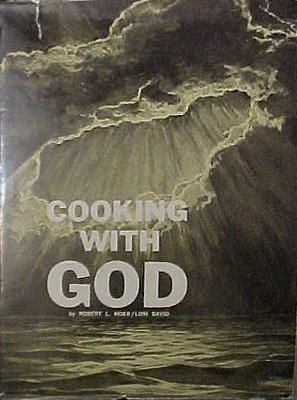
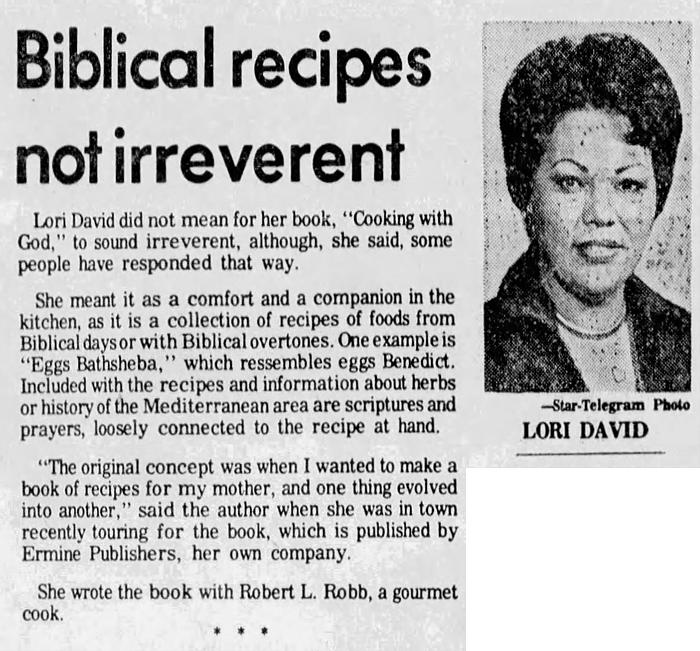
Fort Worth Star Telegram - Mar 16, 1977
Posted By: Alex - Wed Aug 05, 2020 -
Comments (5)
Category: Food, Cookbooks, Religion, Books

| Who We Are |
|---|
| Alex Boese Alex is the creator and curator of the Museum of Hoaxes. He's also the author of various weird, non-fiction, science-themed books such as Elephants on Acid and Psychedelic Apes. Paul Di Filippo Paul has been paid to put weird ideas into fictional form for over thirty years, in his career as a noted science fiction writer. He has recently begun blogging on many curious topics with three fellow writers at The Inferior 4+1. Contact Us |




